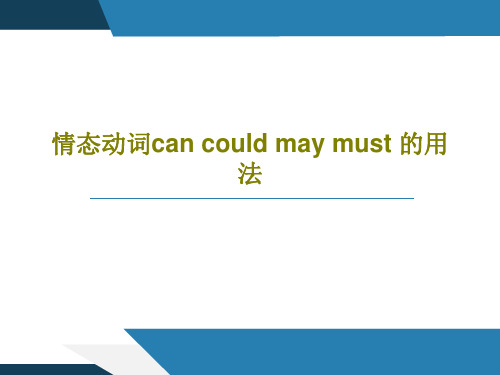语法专项情态动词can和could的用法PPT课件
合集下载
情态动词can could may must 的用法PPT文档21页

情态动词can could may must 的用 法
1、纪律是管理关系的形式。——阿法 纳西耶 夫 2、改革如果不讲纪律,就难以成功。
3、道德行为训练,不是通过语言影响源自,而是 让儿童 练习良 好道德 行为, 克服懒 惰、轻 率、不 守纪律 、颓废 等不良 行为。 4、学校没有纪律便如磨房里没有水。 ——夸 美纽斯
5、教导儿童服从真理、服从集体,养 成儿童 自觉的 纪律性 ,这是 儿童道 德教育 最重要 的部分 。—— 陈鹤琴
谢谢你的阅读
❖ 知识就是财富 ❖ 丰富你的人生
71、既然我已经踏上这条道路,那么,任何东西都不应妨碍我沿着这条路走下去。——康德 72、家庭成为快乐的种子在外也不致成为障碍物但在旅行之际却是夜间的伴侣。——西塞罗 73、坚持意志伟大的事业需要始终不渝的精神。——伏尔泰 74、路漫漫其修道远,吾将上下而求索。——屈原 75、内外相应,言行相称。——韩非
2020中考专题 专题七 情态动词(共15张PPT)

真题再现: 1. – I want to go to the cinema, Mum.
- OK, but you __m_u__st__ be back by 11 o’clock.
2. You __m_u_s_t_n_’t___ play with fire, Tom. It’s too dangerous.
2. - Can you go surfing with us this afternoon? - I’d like to. But I ___h_a_v_e_t_o____ look after my sister at home, because my mother is ill
专题八 情态动词
A. may
B. can
C. has to
D. must
2. – Where are you going this month?
- We _________ go to Xiamen, but we didn’t decide yet.
A. needn’t
B. must
C. might
D. mustn’t
3. - Must I hand in all my money, Mum? - No, you __n_e_e_d_n_’t__. You can use it to buy some school things.
考点 2 must 表推测, 常用在肯定句中,意为“一定”
例: There is someone knocking at the door. It must be Jack.
2. - May I take the newspaper away?
- No, you ______. You can read it only here.
- OK, but you __m_u__st__ be back by 11 o’clock.
2. You __m_u_s_t_n_’t___ play with fire, Tom. It’s too dangerous.
2. - Can you go surfing with us this afternoon? - I’d like to. But I ___h_a_v_e_t_o____ look after my sister at home, because my mother is ill
专题八 情态动词
A. may
B. can
C. has to
D. must
2. – Where are you going this month?
- We _________ go to Xiamen, but we didn’t decide yet.
A. needn’t
B. must
C. might
D. mustn’t
3. - Must I hand in all my money, Mum? - No, you __n_e_e_d_n_’t__. You can use it to buy some school things.
考点 2 must 表推测, 常用在肯定句中,意为“一定”
例: There is someone knocking at the door. It must be Jack.
2. - May I take the newspaper away?
- No, you ______. You can read it only here.
【高考】英语语法完全讲解情态动词ppt课件

can/could have done“过去本能够做某事,实际上并 没有做”。 You could have done better, but you didn’t try your best.
may/might have done“过去也许已经做过某事”,否 定形式may/might not have done表示“过去可能没做 过某事”;might have done还表示“过去本可能做某 事,实际没有做”。 It’s too late. I think he may have gone to bed. He may/might not have finished the work. But I think you might have told us half an hour ago.
--Yes, you can/may(No, you can’t/mustn’t). 2、shall在疑问句中与第一人称连用时,表示征求对方意见; 情态动词can和could常用来表示“能力”,强调能够做某事,can表示现在的能力,could表示过去的能力。
He dared not look at her in the face. You could have done better, but you didn’t try your best.
2.中国应对全球化的政策
Tom’s father promises 44、关于(爱)这个字眼,又有几人能读懂能将其看透。
:北方地区
that
he
shall
buy
his
son
a
new bike on his birthday.
第四大类:表示必要、偏要
must表示主观上必须做某事,mustn't表示“禁止、一定不可 以”,还可以表示“偏偏、偏要”,have to表示受客观条件的 限制,不得不做某事。should表示应该做某事,有义务做某事, 此外,should还可以表示“竟然、居然”。 Children mustn’t play with fire. She must do anything against her parents’ will. You should go and visit him this afternoon. It is unbelievable that the poor man should help others. Why should you be so late today? --Must I work out the problem tonight? --No, you needn’t/don’t have to.
情态动词表推测PPT课件

他也许不认识那位科学家。
第10页/共17页
• 3.疑问句中用can/could (能……?)。 (1)—————— he finish the task? 他可能把任务完成吗? (2)———— he be at home now? 他现在能在家吗?
第11页/共17页
Choose the best answers :
5. –Look, someone is coming.
Guess__________ .
--Jack. He’s always on time.
A. who can it be
B. who he may
C. who he can be
D. who it can be
第14页/共17页
6. David, you _____play with the valuable
第2页/共17页
(2)must表推测只能用于肯定句。 如表示“一定不、肯定不”的意思时,改为否定用can`t, 如询问某种可能时,应用can。 He must know my address. 他肯定知道我的地址。 (一定) He can`t know my address. 他肯定不知道我的地址。 (一定不) Can he know my address? 他知道我的地址吗? (询问可能性)
(4)在反意疑问句中,当附属部分含有 表示推测意义的must时,疑问部分的助 动词应与must后面的动词在非推测情况 下的用法保持一致。 He must be a worker, isn`t he? (现在)他 准时个工人,是吗?
第5页/共17页
2性”时,往往用 于否定句或疑问句。Can`t“一定不”, can在疑问句中意思是“会、可能”。 He can`t be at home. = It is impossible that he is at home. 他一定不在家。
第10页/共17页
• 3.疑问句中用can/could (能……?)。 (1)—————— he finish the task? 他可能把任务完成吗? (2)———— he be at home now? 他现在能在家吗?
第11页/共17页
Choose the best answers :
5. –Look, someone is coming.
Guess__________ .
--Jack. He’s always on time.
A. who can it be
B. who he may
C. who he can be
D. who it can be
第14页/共17页
6. David, you _____play with the valuable
第2页/共17页
(2)must表推测只能用于肯定句。 如表示“一定不、肯定不”的意思时,改为否定用can`t, 如询问某种可能时,应用can。 He must know my address. 他肯定知道我的地址。 (一定) He can`t know my address. 他肯定不知道我的地址。 (一定不) Can he know my address? 他知道我的地址吗? (询问可能性)
(4)在反意疑问句中,当附属部分含有 表示推测意义的must时,疑问部分的助 动词应与must后面的动词在非推测情况 下的用法保持一致。 He must be a worker, isn`t he? (现在)他 准时个工人,是吗?
第5页/共17页
2性”时,往往用 于否定句或疑问句。Can`t“一定不”, can在疑问句中意思是“会、可能”。 He can`t be at home. = It is impossible that he is at home. 他一定不在家。
情态动词can的用法课件

情态动词表示说话人对某一动作 或状态的态度或看法,包括可能 性、必要性、意愿等。
特点
情态动词没有人称和数的变化, 其后必须接动词原形。
情态动词分类
可能性情态动词
can, could, may, might
必要性情态动词
must, should, ought to
意愿性情态动词
will, would, shall, should
混淆can与may的用法
03
can表示能力和可能性,而may表示推测或允许,两者在语境中
应区分使用。
情态动词can拓展知识点
情态动词can的过去式
could,用法与can相似,但语气更委婉。
情态动词can与其他情态动词连用
如“You should can do it.”(你应该能做到。)表示强调。
用could表示推测与猜测
要点一
could用于推测过去或现在
could是can的过去式,但也可以用于表示对现在或过去的 推测,例如,“He could be busy.”(他可能很忙。)
要点二
could表示猜测的语气
与can相比,could表示的猜测语气更为委婉或不确定,通 常用于表示基于不完全信息或主观判断的推测,例如, “It could be a good idea.”(这可能是个好主意。)
情态动词can的用法课件
目录
CONTENTS
• 情态动词can基本概念 • 情态动词can表示能力 • 情态动词can表示可能性与推测 • 情态动词can与其他情态动词比较 • 情态动词can在特殊句型中的运用 • 情态动词can总结与拓展
01
CHAPTER
情态动词can基本概念
特点
情态动词没有人称和数的变化, 其后必须接动词原形。
情态动词分类
可能性情态动词
can, could, may, might
必要性情态动词
must, should, ought to
意愿性情态动词
will, would, shall, should
混淆can与may的用法
03
can表示能力和可能性,而may表示推测或允许,两者在语境中
应区分使用。
情态动词can拓展知识点
情态动词can的过去式
could,用法与can相似,但语气更委婉。
情态动词can与其他情态动词连用
如“You should can do it.”(你应该能做到。)表示强调。
用could表示推测与猜测
要点一
could用于推测过去或现在
could是can的过去式,但也可以用于表示对现在或过去的 推测,例如,“He could be busy.”(他可能很忙。)
要点二
could表示猜测的语气
与can相比,could表示的猜测语气更为委婉或不确定,通 常用于表示基于不完全信息或主观判断的推测,例如, “It could be a good idea.”(这可能是个好主意。)
情态动词can的用法课件
目录
CONTENTS
• 情态动词can基本概念 • 情态动词can表示能力 • 情态动词can表示可能性与推测 • 情态动词can与其他情态动词比较 • 情态动词can在特殊句型中的运用 • 情态动词can总结与拓展
01
CHAPTER
情态动词can基本概念
情态动词基本用法PPT课件

第17页/共31页
判断正误: How dare you say such a thing? How dare you to say such a thing?
He daren’t to speak English before such a crowd, did he? He daren’t speak English before such a crowd, dare he?
第16页/共31页
7. need Do you need any help? I wonder whether he need send it immediately. I need hardly tell you that the work is dangerous. The garden doesn’t need watering at the moment. You needn’t finish that work today.
第12页/共31页
• (8).用于表达不成熟的意见. I should say she’s over for ty. I should imagine It will take about three hours. (9). 与疑问词连用表示不感兴趣,难以置信等 How should I know? Why should he think that? I turned round on the bus and who should be sitting behind me but
第18页/共31页
8. used to do sth 过去常常做某事
• I used to go to the cinema a lot. • He used to be a heavy smoker, didn’t he? • He used to be a heavy smoker, usedn’t he?
判断正误: How dare you say such a thing? How dare you to say such a thing?
He daren’t to speak English before such a crowd, did he? He daren’t speak English before such a crowd, dare he?
第16页/共31页
7. need Do you need any help? I wonder whether he need send it immediately. I need hardly tell you that the work is dangerous. The garden doesn’t need watering at the moment. You needn’t finish that work today.
第12页/共31页
• (8).用于表达不成熟的意见. I should say she’s over for ty. I should imagine It will take about three hours. (9). 与疑问词连用表示不感兴趣,难以置信等 How should I know? Why should he think that? I turned round on the bus and who should be sitting behind me but
第18页/共31页
8. used to do sth 过去常常做某事
• I used to go to the cinema a lot. • He used to be a heavy smoker, didn’t he? • He used to be a heavy smoker, usedn’t he?
情态动词用法总结PPT课件

Eg: 1)--- May I watch TV after supper? --- Yes, you may. / No, you mustn’t.
2) Today is Sunday. She may not in her of
2. 表示可能性。 意为“或许,可能” might 比 may 可能性小。
A. couldn’t have attended B. needn’t have
C. mustn’t have attended
D. shouldn’t ha
5. There’s someone outside. WAho ____it be?
A. can
B. need
C. may
D. must
B
gentleman _____
be so rude to a lady.
A. can
B. should
C. may
D. must 2. ---- WhenB can I come for the photos? I need
them
c tomorrow afternoon.
---- They _____ be ready by 12:00
3. 表示“请求” “允许”(表请求时,口语中常用 could 代替 can 使语气更委婉,回答时用can)
4) Can/Could I use your dictionary? 5) Could you lend me a hand?
4. can 用于疑问句或否定句中时,表惊异、 不相信等,意思是“可能、能够”。
____be rather cold someCtimes.
A. can
B. need
C. dare
2) Today is Sunday. She may not in her of
2. 表示可能性。 意为“或许,可能” might 比 may 可能性小。
A. couldn’t have attended B. needn’t have
C. mustn’t have attended
D. shouldn’t ha
5. There’s someone outside. WAho ____it be?
A. can
B. need
C. may
D. must
B
gentleman _____
be so rude to a lady.
A. can
B. should
C. may
D. must 2. ---- WhenB can I come for the photos? I need
them
c tomorrow afternoon.
---- They _____ be ready by 12:00
3. 表示“请求” “允许”(表请求时,口语中常用 could 代替 can 使语气更委婉,回答时用can)
4) Can/Could I use your dictionary? 5) Could you lend me a hand?
4. can 用于疑问句或否定句中时,表惊异、 不相信等,意思是“可能、能够”。
____be rather cold someCtimes.
A. can
B. need
C. dare
